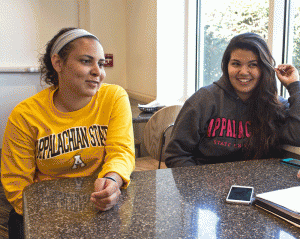The Lumbee Native Americans, mostly residing in North Carolina’s poorest county, Robeson County, have begun to work towards a brighter future by getting an education in places such as Appalachian State University.
Lumbees are the largest Native American nation in North Carolina. After numerous name changes, the tribe finally settled on their

name, which comes from Lumbee River that winds through Robeson County.
They are unique in particular because they are free to reside wherever they want; whereas other Native American nations live on reservations, often times leading them to alcoholism and unemployment due to government dependence, said Katie Sampson, a freshman chemistry major and Lumbee Native American.
Both Sampson and Savannah Bowen, a junior exercise science major are first-year Appalachian students and of the few in their families to attend college. Bowen is a junior in standing due to attending early college.
Bowen said she hopes to go off to medical school after graduating from Appalachian and potentially open her own pediatrics clinic to reach out to her Native American culture and community.
Sampson said she hopes to one day work as a pharmacist by graduating from Appalachian with a degree in chemistry and then attending pharmacy school.
On Sept. 27, the second part of a two-day meeting, the Broadcast Education Association Media Conference assembled at Appalachian’s Walker Hall and featured the first place winning documentary film titled, “The Voices of the Lumbee.”
The film tells of the ongoing struggles the Lumbees have faced throughout history beginning with economic downturn in the coastal plains region to modern-day socioeconomic challenges faced in Robeson County, according to www.voicesofthelumbee.com. The documentary includes direct statements and opinions from the Lumbee elders, allowing their voices to be heard.
Modern day Lumbees have fought against government dependence by working hard to build a better community, such as having their own doctors’ offices and banks, including the Lumbee Guaranty Bank, which currently has 12 branches.
“We also have a lot of facilities like Lumbee Housing that helps our people build houses when they get run down and culture centers for the young kids in the community,” Bowen said.
In addition, the percentage of Lumbee students attending colleges and universities has increased. Most attend University of North Carolina at Pembroke or Robeson Community College, which have high enough acceptance rates to encourage Native Americans to further their education, Sampson said.
It is estimated that the amount of Native Americans attending Appalachian has increased from 51 students who identify as American Indian or Alaska Native as of fall 2013 to 62 Native American students as of fall 2014, said Everette Nichols, Interim Assistant Director for Multicultural Student Engagement. Nichols also said Appalachian does not keep records of how many of these students are specifically Lumbee Native American.
Even Native American adults are now seeking something more than a minimum wage job by attending college.
“My great uncle graduated from [UNC] Pembroke, but then there were so many years that generations under him didn’t go and he was the only one of the three of his siblings that went to college, so it does show how it’s changed over time and how we are trying to better ourselves,” Bowen said.
Sampson also said her mom is now a pre-kindergarten teacher after going back to school in her upper 30s to receive her bachelor’s degree, and is now considering going back to get her master’s degree as well.
The Lumbees have been recognized by the state of North Carolina since 1885, but are currently working to be federally recognized as an Indian tribe, according to www.lumbeetribe.com.
According to the website, the Lumbee Native Americans are proud of their culture and their ancestors extending from the 1700s with the Cheraw and related Siouan-speaking Indians living in what is now known as Robeson County.
“We’re kind of modernizing,” Sampson said. “But we’re also trying to keep our culture up.”
Story: Chamian Cruz, Intern News Reporter
Photo: Kelly Walker
